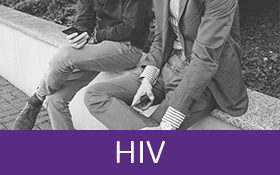What is HIV?
HIV (human immunodeficiency virus) is a virus spread through certain body fluids that prevents the body from fighting off other infections and diseases. HIV can be treated with medications. Treatment can also prevent the spread of HIV. People living with HIV who regularly take their medication can live long, healthy lives. When HIV is not treated, it can develop into AIDS (acquired immunodeficiency syndrome) and cause death.
How is HIV spread?
HIV can affect anyone regardless of sexual orientation, race, ethnicity, gender or age. HIV is only spread through certain body fluids—blood, male and female sexual fluids, rectal fluids, and breast milk. The most common ways to get HIV are by:
- Having condomless anal or vaginal sex.
- Sharing equipment used to inject drugs.
Less commonly, a mother living with untreated HIV may give HIV to her child during pregnancy, birth or breastfeeding; or a person might get HIV by being stuck with an HIV-contaminated needle or other sharp object.
What are they symptoms of HIV?
Some people with HIV have flu-like symptoms within 2 to 4 weeks of getting HIV. The following symptoms may occur:
- Fever
- Chills
- Rash
- Night sweats
- Muscle aches
- Sore throat
- Fatuge
- Swollen lymph nodes
- Mouth ulcers
Many signs of HIV are similar to symptoms caused by other illnesses. If you think you have been exposed to HIV, it is important to get tested.
What should you do if you think you have HIV?
Get tested as soon as possible if you think you have been exposed to HIV. If you are living with HIV, starting and staying on HIV treatment can keep you healthy. Staying on treatment is also a proven way to prevent giving HIV to other people.
How is HIV treated?
- HIV is treated using a combination of medicines called antiretroviral therapy (ART) that are taken every day.
- ART dramatically reduces the amount of active HIV in the body, which keeps the immune system functioning, and keeps people living with HIV healthy.
How to prevent HIV
- Limit your number of sexual partners.
- Never share equipment to inject drugs.
- Use condoms the right way every time you have sex because a partner could have untreated HIV.
- Get tested for other sexually transmitted infections regularly and get treated immediately if you test positive.
- Take medicines such as pre-exposure prophylaxis (PrEP) and post-exposure prophylaxis (PEP).
PrEP
Pre-exposure prophylaxis (PrEP) is an extremely effective way to reduce the likelihood of getting HIV. PrEP is a pill that a person living without HIV takes once a day to reduce the risk of getting HIV. The pill includes two of the same medications used to treat HIV. PrEP is most effective when used with other prevention efforts, such as condoms.
PEP
Post-exposure prophylaxis (PEP) is used after a possible exposure to HIV. PEP therapy must begin within 72 hours after a possible exposure. It typically consists of daily prescribed HIV medications for four weeks.
For more information, call Denver Public Health at (303) 602-3540.
Sources:



